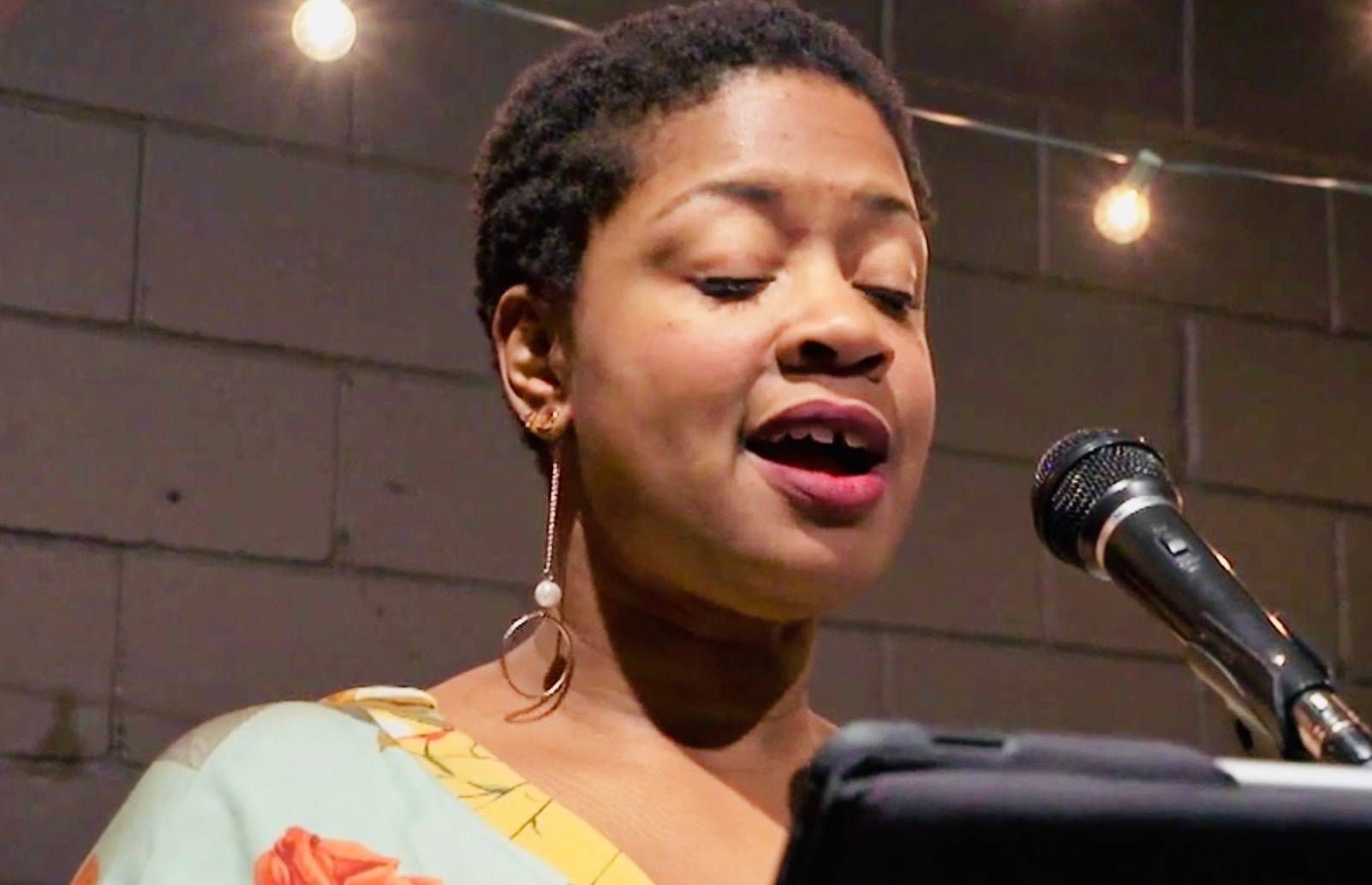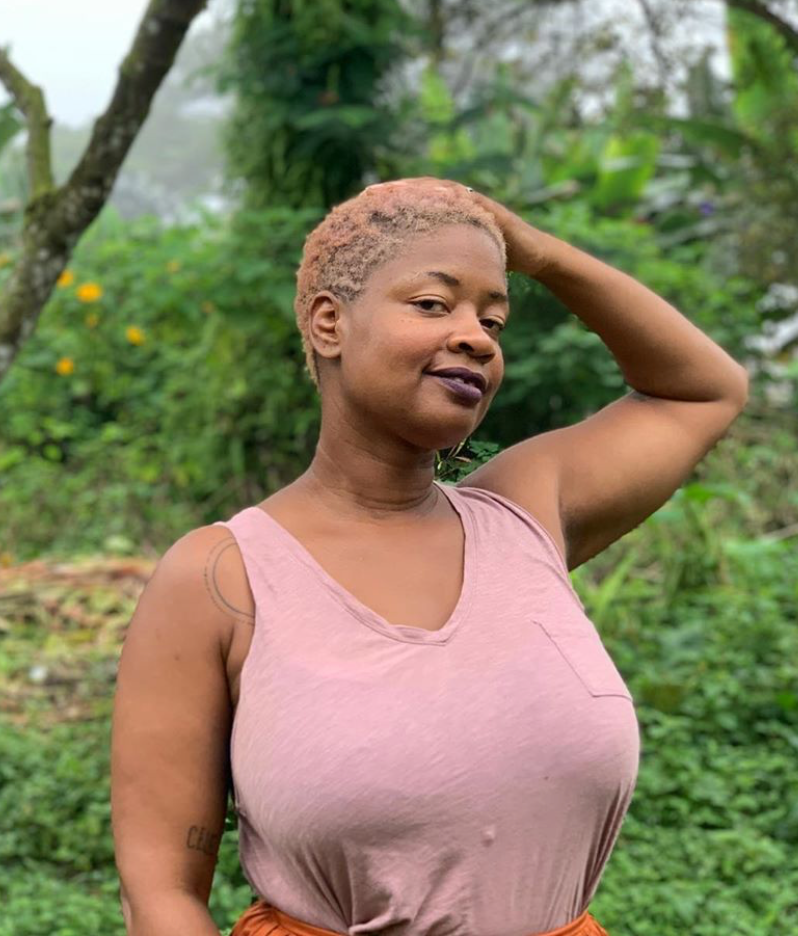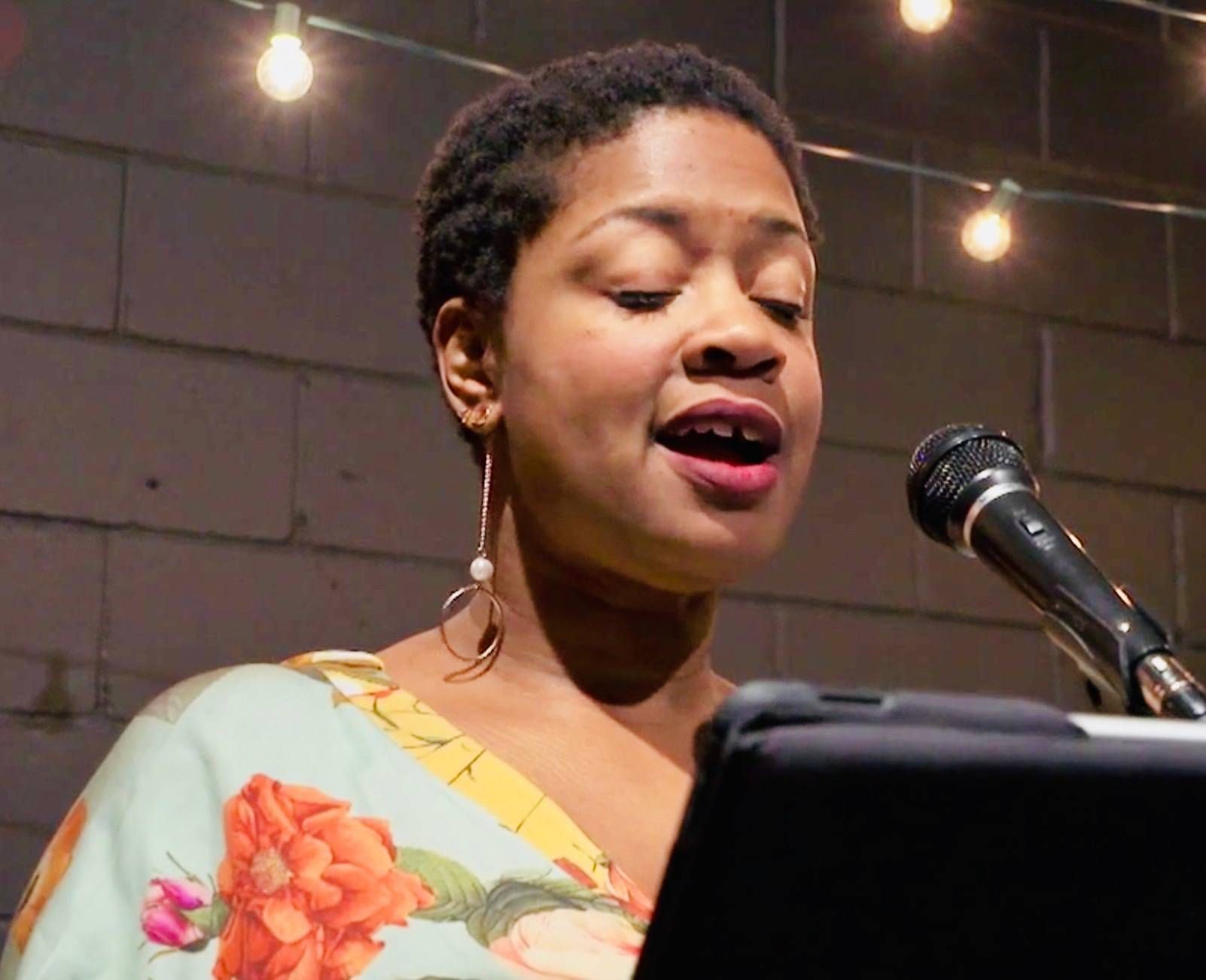Junauda Petrus-Nasah Creates a World of Radical Whimsy in Her Art

For Junauda Petrus-Nasah, our world is at a critical creative moment. Though Junauda’s work has long revolved around her vision for racial equity, she believes that making political art that imagines a just world is more essential now than ever. She practices her particular vision for political art in the queerness of her circus performance, the magical realism of her writing and the ancestral connection that informs her spirituality. And as the movement for racial justice continues, Junauda is paying attention to how that vision becomes reality.
When we think of what it means to demonstrate courage and fight for a better reality for Black people in the U.S., we often envision the righteous protests that continue to fill our streets. But bravery exists in many different forms. In this interview series, we hear from Black women who are using performance art to speak up, undaunted against white supremacy and police violence.

In her own words, Junauda shares her bright, imaginative worldview:
“My origin story as an artist comes from being a youth worker, being an activist and organizer. I didn’t see and identify myself as an artist until I was 30, 31. In the meantime, a lot of the stuff I did was working in the community, both in Minneapolis and in New York City, teaching organic gardening to kids, and yoga, writing and theater. As an artist, so much of my identity comes from being in community. What really pulled me into being a performer and a creative was doing circus arts... this creative space that was so whimsical and magical and transformative. Bringing my Black body and my curvy body into that space really unlocked so much for me around futurism, and getting to be in different dimensions as a literal, physical, embodied person. Even in circus I was thinking of lynching, of histories.
What is it for me and my Black body, queer body, femme body, to be in the sky on a rope, doing acrobatics and all of this other whimsical stuff, when so much of Black bodies in the sky on a rope has meant lynching and violence?
A lot of it was healing my experience being Black and queer in a society that is so anti-Black and anti-queer, inherently. My queerness really did blossom and come out with stepping into my artistry.
I feel very called to hold both the physical embodiment of futurism and abolition, because so much of my life has been so cerebral. I don’t want people to think abolition, I want them to feel abolition in their bodies. These are all systems we’ve absorbed, and have been told that these are the only structures in existence and in being in relationship with one another. So much of what I reflected on in this time of uprising, both as an artist and as a Black person and a queer person, is, ‘Wow, this is what it may have felt like at Stonewall.’ A lot of queer folks and a lot of trans folks are leading these Black movements now, which to me is so necessary. There’s a necessary imagination that comes with having a queered reality. We need to queer our imagination around how we show up for care and show up for harm. There’s so much that I’ve discovered through having to face the journey of becoming myself.
I hold very deeply the lineage of being a Black person born in the United States, of parents that were born in the Caribbean, and the ways that I’ve held those Blacknesses, which overlap and relationship mutually with one another but are still distinct. These ideas of Blackness are extremely expansive, as well as essential; [they] can be very specific to community, and are also borderless. Black bodies have become such a stigmatized thing and triggering within our collective psyche, whether you’re Black or not. Everybody is taught that Blackness is a scary, criminalized thing. This has totally concealed the real violence that is happening against our societies.
The work I’m doing right now around Black artistry... I just wanna be present. I think for a while, when we initially got the opportunity to develop a project, I had all these ideas and they were very much ideas that pushed me out of myself. It’s very typical to the art I make, where it’s bringing community together. [With] the coronavirus...I wasn’t able to be in spaces rehearsing in the way I may have imagined. Then the uprising happened. All of it was so emotional and so deep, that it was hard for me to understand what I need to be doing in this moment for a creative piece, and I struggled with it. I’ve landed on that, I just want to be present with myself. It’s kind of like being a child. I was just wildly and widely curious and present and paying attention and being observant. I’m just trying to be present with myself and not trying to do the rigamarole. For the container, it’s going to be film work, so I’m working with a filmmaker, Adriana Foreman, to capture some things with me. I also want to do a lot of writing about how I’m feeling right now and share it with people.

I feel like [right now] I’m doing what I’ve always been doing. I’ve done a lot of stuff with circus and puppetry, and I’ve still dealt with issues like the police state, violence against Black bodies, Black joy and queer Black ancestral healing. I can interrogate and have these real conversations, and I can make it pretty and whimsical and magical and transformative. I don’t believe in this false binary that either you can make magical, beautiful work or this stuff is impactful. I’m a person that’s committed to ending the police state. Period, as the youth say. My life’s purpose is art. A lot of my writing in fiction has been in the young-adult space, which for me, it plays with this tension of the magical limitless whimsy of the youth lens and the youth existence as a prototype. That youth space is a compelling one for me to respond and reflect on what’s happening in society.
How are we calling the names of all of our beautiful queer trans ancestors, who were just magical and brought us sweetness? In the book that I wrote, which is a young adult novel, one of the characters is obsessed with Whitney Houston; it’s become clear that [Houston] was a person that was bisexual or queer. I think about a lot of Black artists - Little Richard, all of these folks that were just brilliant creatives - and had Black queerness. I talk to my ancestors so much. I really do like to talk to my ancestors so much and listen to them and see them and witness the feelings of them. I’ve really been thinking about my Black ancestors, and my African, Caribbean ancestors, and just how much labor and exhaustion and weight and heaviness and depression [they carry]. I think everyone has their ancestors that they are holding, and I want to encourage white people to acknowledge that they have ancestors that are trying to talk to them.
With my ancestors, I’m thinking of, how do I rest on their behalf? My mom, when I was growing up, everything was always working and moving, and now I see her in this place in her life where she gets to be so tender with existence. Things are soft. I want that for Black people. In [many] ways our society has positioned Black softness and Black care as taking away from white dominance and white comfort. When we really analyze the world, if we give everybody access to everything, everything would be cool. What’s exciting to me, and thinking about defunding the police, is, could these officers who really want to serve community, could they serve community without the government and without a badge? What does it look like to take wealth from a militarized force and give it to people who need to eat and need a house?
I would love, love, love if white folks started to learn the real history. You can handle a history that is not lying to you about your existence. It’s such an egregious lie, that there’s anything prideful about what happened. I was asking my wife, ‘Baby, when this is all done, do you think they’re gonna rewrite history like they rewrote the Civil War to themselves? Are they, even after so many people are gonna die?’ The fact [is] that the whole root of it [white supremacy] was based off the lie that they needed to feel like they were superior to people that they were actually not superior to.
To me, I don’t think people are real artists unless they try to change some real [problems] in the world. Period. If you’re not riddling yourself with how you can end white supremacy, if you’re not an artist actively trying to burn [these systems] down, symbolically, you’re just a racist white person to me that don’t care about me. Period. Artists, you have to be interrogating that stuff. You have to be figuring out life-giving ways of existence. I think about people like Toni Morrison; it wasn’t political, it was political in the sense that we have been so bereft of the interior complexities of Blackness that she is political. For every Toni Morrison, there are countless Black writers who were speaking our truth, and Indigenous writers, and other POC and immigrant, Latinx, Asian. And understanding that these aren’t just immigrant communities either, that these are communities that have been around forever. We are on Latinx land, Indigenous land.
For BIPOC artists, there’s a lot of healing that we need to do within ourselves individually, there are a lot of lines within our own racial and cultural and community groups...there are so many conversations that we don’t get to have amongst each other because we always having it with whiteness. We need to ask for more money. Period. We do so much free labor, and we’re not being paid enough. I think white folks need to look at what that privilege is, that they have experienced. They need to look at curriculums like Me and White Supremacy by Layla Saad and pay for [it].
If you think art is only about aesthetic, that’s white supremacy. I wanna do art and include the history rather than divorce from it. Artists, we need to nourish ourselves, and continue to be deeply honest with ourselves, and let it blossom within the art, as it should.
I’m working on my second book, which is gonna be about a Black girl studying circus. It’s gonna be really weird, experimental, and emo, and super sexy and queer. I really like healing this part of myself that wanted to be this free-spirited, cool, queer Black girl that just didn’t get to because I felt so afraid and ashamed of my sensuality and sexuality. So this book is gonna be hot, whimsical, intense, humorous, hard, dark humor and magic realism. I’m also working on the adaptation of my [first] book into film, so that’ll be a film in the next couple years.”
Junauda is the co-founder of Free Black Dirt, a Minneapolis-based arts collective.
Learn more about Junauda’s body of work.
Junauda Petrus-Nasah and Erin Sharkey write for the page, stage and screen, produce, direct, and they’ve also done work with puppetry and aerial arts. If you said they dabbled in bronze casting, no one would be surprised. Get to know the duo behind Free Black Dirt.
Vanessa B. Agnes could not stand idly by as the city of Minneapolis grieved George Floyd’s police killing. So, in a 10-day period of time, she curated “the Uprising Vol. I.” This June 2020 event brought immense healing to the hundreds of Twin Cities residents, who gathered in a church parking lot to experience stories, spoken word poetry, dance, and song. Now, her new performing arts collective, Dark Muse Performing Arts, is flourishing and spreading hope throughout the Twin Cities.
Deneane Richburg founded the modern dance-figure skating-social justice collective Brownbody to create mesmerizing works in which the past cuts right through to the present like a sharp pair of scissors. Find out how she blends artistic genres with African diasporic history in this story from Minnesota Original.
